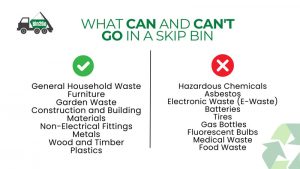Skip Bin Do’s and Don’ts: Restricted Items Explained
Skip bins are essential for efficient waste disposal, but it’s vital to understand what you can and cannot put in them. Proper disposal practices not only ensure safety but also compliance with environmental regulations. This comprehensive guide outlines the do’s and don’ts of skip bin usage, especially concerning restricted items.
Understanding Restricted Items
Restricted items refer to materials that are hazardous, pose environmental risks, or require specialized handling and disposal methods. It’s crucial to be aware of these items to prevent accidents, protect waste handlers, and comply with legal requirements.

Skip Bin Do’s and Don’ts: Restricted Items Explained
Common Restricted Items:
Below are some of the most common items that should never go into a skip bin:
- Chemicals and Hazardous Materials: This includes paint, solvents, pesticides, and asbestos. These substances can leak, mix with other waste, and contaminate the environment.
- Electronics and Electrical Waste: Items like TVs, computers, batteries, and appliances contain hazardous materials that require proper recycling.
- Batteries: Both single-use and rechargeable batteries contain toxic chemicals like lead and mercury.
- Medical Waste: Used syringes, medications, and medical equipment pose health risks and require specialized disposal.
- Flammable Liquids: Materials such as gasoline, oil, and propane can ignite easily and pose fire hazards.
- Asbestos: Asbestos fibers are carcinogenic and require licensed professionals for safe handling and disposal.
- Heavy Items: Items exceeding weight limits, like concrete or car parts, can damage skip bins and pose risks during transportation.
- Food Waste: Organic waste decomposes quickly and attracts pests if left in skip bins.
- Tires: Old tires are bulky and should be taken to tire recycling facilities for proper disposal.
- Illegal Items: Firearms, explosives, and restricted chemicals must never be disposed of in skip bins due to legal and safety concerns.
Do’s for Skip Bin Usage
Follow these guidelines to ensure safe and effective skip bin usage:
- Separate recyclable materials such as metal, plastic, and glass for proper recycling.
- Bag loose materials like soil or rubble to prevent spillage and ensure efficient disposal.
- Consult with your skip bin provider for specific guidelines on permissible waste types and weight limits.
- Secure skip bin lids to prevent unauthorized access and potential hazards.
- Monitor the fill level to avoid overloading the skip bin beyond capacity.
Don’ts for Skip Bin Usage
Avoid these common pitfalls when using skip bins:
- Never dispose of hazardous or prohibited items, even if they seem harmless.
- Avoid overfilling skip bins, as it can lead to spillage and safety hazards during transportation.
- Do not place skip bins on soft ground or uneven surfaces that could cause tipping or damage.
- Avoid mixing different types of waste that require separate disposal methods.
- Do not ignore local regulations and guidelines regarding skip bin usage and waste disposal.
By following these do’s and don’ts of skip bin usage, you can ensure safe, compliant, and environmentally responsible waste disposal practices. For expert advice on skip bin rental and waste management solutions, contact [Your Company Name] today.
